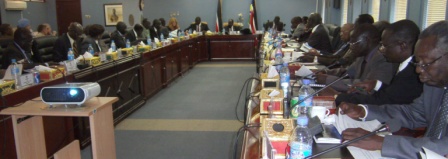UNMISS chief briefs cabinet on new mandate of UN forces in South Sudan
October 1, 2011 (JUBA) – The Special Representative of the United Nations Secretary General to South Sudan, Hilde Johnson, briefed the South Sudan’s cabinet for the first time on the UN’s mandate in Africa’s newest country.

By December around 7,000 United Nations Mission in South Sudan (UNMISS) peacekeepers and UN police are due to be deployed.
The government’s spokesman and minister of information, Barnaba Marial Benjamin, told the press after the briefing by Johnson that a number of countries in Asia and Africa are ready to contribute troops to the mission.
Marial however added that the cabinet will further discuss the nature of the mandate in a meeting scheduled for early next week.
The mandate which was adopted under chapter seven of the UN charter as a result of resolution number 1996 (2011) passed by the UN Security Council in New York at its 6576th meeting, on 8 July 2011, the day before South Sudan became independent.
Under chapter seven’s strong mandate, the forces have the power to protect the civil population from any danger by deterring threats and in some cases engaging in military action against the source of the imminent threat.
The forces will mainly be deployed in South Sudan’s states that have borders with North Sudan.
The mission will report to the Security Council in every four months on the situation in South Sudan, including on issues of human rights to Geneva.
Hilde Johnson, who was accompanied to the cabinet by the force commanders, explained that the intention of the mandate was to make sure that South Sudan emerges as a success story as an independent country after decades of internal conflict and war with North Sudan.
The United Nations is also concerned that the region might plunge into tribal wars. In August 600 people were killed in Jonglei state when Murle raiders attacked Luo Nuer areas. This was in response to an earlier raid by the Luo Nuer against the Murle. This is just one example of the cycle of cattle raiding and violence that has blighted the region since it gained autonomy in 2005 and that have continued after independence.
There are also numerous internal rebellions mainly caused by disputed results in elections in April last.
(ST)
